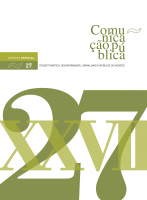Como as leis estão a definir (e a criminalizar) as fake news
DOI:
https://doi.org/10.4000/cp.5423Palavras-chave:
fake news, desinformação, internet, redes sociais, humorResumo
As iniciativas legislativas para combater a desinformação e as fake news da Alemanha, do Brasil, da França, da Malásia ou de Singapura têm gerado bastante polémica, e não apenas nestes países. Tratando-se de iniciativas pioneiras, têm merecido muita atenção além-fronteiras. Neste trabalho, analisamos de que forma cada uma destas cinco iniciativas legislativas enquadra a questão das fake news para concluir que a grande maioria centra o seu objeto na falsidade dos documentos ou das afirmações feitas online. As diferentes propostas legislativas são minimalistas e pouco ‘explicativas’, parecendo funcionar como experiências ou testes, com objetivos mais dissuasores do que de criminalização.
Downloads
Referências
Bakir, V., & McStay, A. (2018). Fake News and The Economy of Emotions: Problems, causes, solutions. Digital Journalism, 6(2), 154–175. Disponível em http://doi.org/10.1080/21670811.2017.1345645 [Consult. em 13 de setembro de 2019]. DOI : 10.1080/21670811.2017.1345645 good / bad
Berkowitz, D. & Schwartz, D. A. (2016). Miley, CNN and The Onion: When fake news becomes realer than real. Journalism Practice. Disponível em https://www.tandfonline.com/doi/abs/10.1080/17512786.2015.1006933 [Consult. em 6 de novembro de 2019]. DOI : 10.1080/17512786.2015.1006933 good / bad
Campbell, A. (2019). How data privacy laws can fight “fake news”. Just Security Disponível em https://www.justsecurity.org/65795/how-data-privacy-laws-can-fight-fake-news/ [Consult. em 12 de setembro de 2019].
Funke, D. & Famini, D., A guide to anti-misinformation actions around the world. Poynter Institute. https://www.poynter.org/ifcn/anti-misinformation-actions/ [Consult. em 12 de setembro de 2019].
Gelfert, A. (2018). Fake news: A definition. Informal Logic, 38(1), 84-117. Disponível em http://tu-berlin.academia.edu/AxelGelfert [Consult. em 13 de setembro de 2019].
Gettings, M. (2007). The fake, the false, and the fictional: The Daily Show as new source. In Holt, J. (ed.). The Daily Show and Philosophy, (pp. 16-27). Oxford, Reino Unido: Blackwell.
Guess, A., Nyhan, B. & Reifler, J. (2018). Selective Exposure to Misinformation: Evidence from the consumption of fake news during the 2016 U.S. presidential campaign. Disponível em http://www.dartmouth.edu/~nyhan/fake-news-2016.pdf [Consult. em 5 de novembro de 2019].
Haciyakupoglu, G., Yang Hui, J., Suguna, V. S., Leong, D. e Rahman, M. F. A. (2018). Countering “fake news” – A survey of recent global initiatives. RSIS. Disponível em https://www.rsis.edu.sg/rsis-publication/cens/countering-fake-news-a-survey-of-recent-global-initiatives/ [Consult. em 12 de setembro de 2019].
Klein, D. O. & Wueller, J. R. (2017), “Fake news”: A Legal Perspective. Journal of Internet Law, 20(10), abril 2017. Disponível em https://papers.ssrn.com/sol3/papers.cfm?abstract_id=2958790 [Consult. em 11 de setembro de 2019].
Law Library of Congress. (2019). Initiatives to Counter Fake News in Selected Countries. Disponível em https://www.loc.gov/law/help/fake-news/counter-fake-news.pdf [Consult. em 11 de novembro de 2019].
Lazer et al. (2018) The Science of fake news. Science 359(6380), 1094-1096. Disponível emhttps://science.sciencemag.org/content/359/6380/1094 [Consult. em 13 de setembro de 2019].
Meneses, J. P. (2018). Sobre a necessidade de conceptualizar o fenómeno das fake news. Observatorio (OBS*) Special Issue (2018), 37-53. Disponível em http://obs.obercom.pt/index.php/obs/article/view/1376 [Consult. em 13 de setembro de 2019].
Nery, J. (2019). A necessary controversy: Defining fake news. Friedrich Naumann Stiftung. Disponível em https://asia.fnst.org/content/necessary-controversy-defining-fake-news; [Consult. em 13 de setembro de 2019].
Pangrazio, L. (2018). What’s new about ‘fake news’? Critical digital literacies in an era of fake news, post-truth and clickbait. Pág. Educ., 11(1), 6-22. Disponível em http://dx.doi.org/10.22235/pe.v11i1.1551 [Consult. em 13 de setembro de 2019]. DOI : 10.22235/pe.v11i1.1551 good / bad
Reilly, I. (2018). F for Fake: Propaganda! Hoaxing! Hacking! Partisanship! and Activism! in the Fake News Ecology. In The Journal of American Culture. Disponível em https://doi.org/10.1111/jacc.12834 [Consult. em 6 de novembro de 2019]. DOI : 10.1111/jacc.12834 good / bad
Richard-Thomson. (2019). Infox ! Le grand livre des Fake News. Paris, França: Desinge & Hugo & Cie.
Rini, R. (2017). Fake News and Partisan Epistemology. Kennedy Institute of Ethics Journal, 27(S2), 43-64. Disponível em https://muse.jhu.edu/article/670860 [Consult. em 13 de setembro de 2019].
Tan, E. G. & Ang, B. (2017). Clickbait: Fake News and Role of the State. RSIS. Disponível em https://www.rsis.edu.sg/rsis-publication/cens/co17026-clickbait-fake-news-and-role-of-the-state/#.W37J_ejFjIV [Consult. em 6 de novembro de 2019].
Tandoc Jr, E. C., Lim, Z. W. & Ling, R. (2017). Defining “Fake News” A typology of scholarly definitions. Digital Journalism, 6. Disponível em https://www.tandfonline.com/doi/citedby/10.1080/21670811.2017.1360143?scroll=top&needAccess=true [Consult. em 11/11/2019].
Torres, R., Gerhart, N. & Negahban, A. (2018). Epistemology in the Era of Fake News: An Exploration of Information Verification Behaviors among Social Networking Site Users.ACM, Digital Library. Disponível em https://dl.acm.org/citation.cfm?id=3242734.3242740 [Consult. em 13 de setembro de 2019].
Verstraete, M., Bambauer, D. E. & Bambauer, J. R. (2017). Identifying and Countering fake news. Arizona Legal Studies Discussion Paper No. 17-15 Disponível em https://papers.ssrn.com/sol3/papers.cfm?abstract_id=3007971 [Consult. em 12 de setembro de 2019]. DOI : 10.2139/ssrn.3007971 good / bad
Wardle, C. & Derakhshan, H. (2017). Information Disorder, Toward an interdisciplinary framework for research and policymaking. Council of Europe. Disponível em https://rm.coe.int/information-disorder-toward-an-interdisciplinary-framework-for-researc/168076277c [Consult. em 13 de setembro de 2019].
Zannettou, S., Sirivianos, M., Blackburn, J. & Kourtellis, N. (2018). The Web of False Information: Rumors, Fake News, Hoaxes, Clickbait, and Various Other Shenanigans. Cornell University Library. Disponível em https://arxiv.org/abs/1804.03461 [Consult. em em 6 de novembro de 2019].
Downloads
Publicado
Edição
Secção
Licença
Direitos de Autor (c) 2019 Copyright (c) 2019 Author

Este trabalho encontra-se publicado com a Licença Internacional Creative Commons Atribuição-NãoComercial 4.0.
Os conteúdos da Comunicação Pública estão licenciados com uma licença Creative Commons - Atribuição-NãoComercial 4.0 Internacional.




